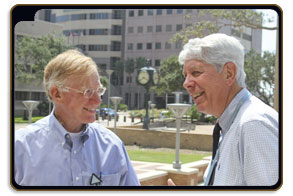Dr. James W. LeDuc Creates Unique Learning Opportunities
to Encourage Global Health Initiatives

Dr. James LeDuc, at right, visits with colleague Dr. David Walker on the UTMB campus. Walker is director of the university�s Center for Biodefense and Emerging Infectious Disease.
In an age when international travel is commonplace, infectious disease outbreaks once relegated to exotic locations are now of concern much closer to home. Recent examples include SARS and the H1N1 influenza virus. Global warming is compounding the problem by pushing the habitat of insects responsible for disease transmission further northward.
People like James W. LeDuc, Ph.D., a UTMB faculty member and one of the country�s leading global health experts, are at the forefront of addressing this challenge. The inaugural holder of the Robert E. Shope, M.D. and John S. Dunn Distinguished Chair in Global Health, LeDuc has deployed funding from the endowment to create Global Grand Rounds to provide clinical assistance to patients and health care providers in areas with limited access to health care services. All of this is accomplished without ever leaving Galveston. Telemedicine equipment installed in overseas facilities allows these discussions to be held live.
Telemedicine features audio-video communication between UTMB and locations outfitted with a mobile unit. These links help health care providers treat patients based on the observations and recommendations of university physicians.
The monthly Global Grand Rounds are held with colleagues in Peru, Argentina, Sierra Leone and Croatia. During the sessions, physicians and scientists discuss cases on diseases common to those countries. A recent discussion with physicians in Croatia focused on tickborne encephalitis, another on viral hemorrhagic fever in Argentina, and a third involved a child with malaria in Sierra Leone.
�We study many of these diseases and others in the Galveston National Laboratory (GNL),� said LeDuc, director of the GNL, the only facility currently in operation on a U.S. academic campus dedicated to the study of the world�s most infectious diseases. �These Grand Rounds provide UTMB physicians and scientists a chance to see acutely ill patients suffering from diseases they might otherwise never encounter. It also allows us to identify opportunities for collaborative research and product development and evaluation, including that which can be done within the GNL.�
The GNL incorporates the highest security and safety measures available to develop diagnostics, therapies, and vaccines for naturally occurring and man-made diseases. The lab builds on UTMB�s leadership in infectious disease research and creates an invaluable resource for training researchers in the field.
Funding from the Shope and Dunn Distinguished Chair has enabled LeDuc to prepare the next generation of pandemic specialists. He has been able to send medical and graduate biomedical sciences students to the countries involved in the Global Grand Rounds, providing them an irreplaceable hands-on experience. He is also collaborating with colleagues to offer a field epidemiology course in rural Peru.
The Sealy & Smith Foundation played a major role in creating LeDuc�s endowed faculty position. In 2006, the Galveston foundation elevated the Robert E. Shope, M.D. Distinguished Professorship in Infectious Disease Epidemiology to the endowed chair level. It bears the name of the late renowned virologist who was the principal investigator for many of UTMB�s federally funded research projects.
The following year, the John S. Dunn Research Foundation helped the endowment become a distinguished chair, adding the name of its founder. The late John S. Dunn Sr., a prominent Houston businessman, established his foundation in 1977.